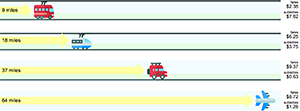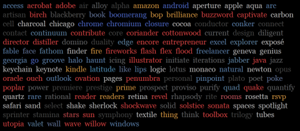Dishonesty Doesn't Pay






















Notes
Why be dishonest when you'd make just as much money in an honest job?
Who'd be a realtor? Realtors are known for dishonesty. Why not be a nurse instead? Nurses are considered to be highly honest. Why would anyone choose to be mistrusted rather than trusted?
I figured it must come down to money. Dishonest jobs, I reckoned, must pay a premium over honest jobs. Otherwise there'd be no reason to be a realtor rather than a nurse.
It turns out I was wrong. This chart plots income against honesty for a variety of jobs, each represeneted by an eye. It shows that dishonest jobs pay no more than honest jobs; if anything, they pay a little less.
Of course, it's difficult to quantify either income or honesty, so it's difficult to be conclusive.
The chart's vertical axis represents how much each job pays. However, this is the median income in the US across all practitioners of the job, and reflects only salary. It does not include expenses, such as the time and money nurses must invest to qualify; nor does it include non-monetary compensation, such as the satisfaction nurses may feel in helping patients.
The chart's horizontal axis represents how honest practitioners of each job are, from the devilishly dishonest on the left to the angelically honest on the right. There's no point asking realtors or nurses how honest they are, of course, since they would all, no doubt, claim to be scrupulously honest. Instead, I have resorted to surveys which ask the public to rate the honesty and ethics of practitioners of each job, and reveal the percentage who respond high or very high.
So I can hardly claim scientific rigour.
Nonetheless, the message of this chart, however tentative, is an unexpectedly positive one. Whether we're talking highly paid executives/doctors, or more modestly paid realtors/nurses, you won't be compensated any more for dishonesty than for honesty. Perhaps if we'd known this when we started out, we'd all have chosen honest jobs.
Subscribe now and I’ll let you know whenever I create a new visualization
It’ll only be every couple of months or so, I won’t let anyone else have your email address, and you can unsubscribe at any time
Thanks for subscribing!
Check your inbox for an email to confirm your subscription
Oh no, something went wrong, and I was unable to subscribe you!
Please refresh your browser and try again
Sources
Gallup – Honesty/Ethics in Professions 2010 – US poll November 19-21, 2010 – Please tell me how you would rate the honesty and ethical standards of people in these different fields - very high, high, average, low, or very low? – percentage responding high or very high
Roy Morgan Research – Image of Professions Survey 2011 – Australian poll March 22-24, 2011 – As I say different occupations, could you please say — from what you know or have heard - which rating best describes how you, yourself, would rate or score people in various occupations for honesty and ethical standards (Very High, High, Average, Low, Very Low)? – percentage responding high or very high
The Bureau of Labor Statistics publishes excellent salary data for different professions in the US; unfortunately, the Gallup survey in the US covers only a very limited number of jobs. To create a larger data set, I have taken the Roy Morgan Research survey in Australia, which asks more or less the same question about honesty and ethics for a wider range of professions, normalised this Australian data to match the US data, and combined the results, taking the average of the US and normalised Australian values where both are available.
Images
Open Clip Art Library – boobaloo – Devil's Eyes
Open Clip Art Library – fred lovern / Platypuscove – Angry_Eyes_00
Open Clip Art Library – Lumen Design Studio / molumen – eyes
Data
A summary of the data used in this presentation is shown below for easy reference
Income
Advertising agents – Advertising Sales Agents, Advertising and Promotions Managers – $61,680
Bankers – Financial Managers – $103,910
Executives – Chief Executives – $165,080
Clergy – Clergy – $43,970
Pharmacists – Pharmacists – $111,570
Lawyers – Lawyers – $112,760
Doctors – Family and General Practitioners – $163,510
Nurses – Registered Nurses – $64,690
Police – Police and Sheriff's Patrol Officers – $53,540
Auto mechanics – Automotive Service Technicians and Mechanics – $35,790
Childcare – Childcare Workers – $19,300
Teachers – Elementary School Teachers, Middle School Teachers, Secondary School Teachers – $52,280
Judges – Judges, Magistrate Judges, and Magistrates – $119,270
Reporters – Reporters and Correspondents – $34,530
Dentists – Dentists, General – $141,040
Engineers – all categories of engineers – $85,500
Lecturers – all categories of post-secondary teachers – $67,170
Accountants – Accountants and Auditors – $61,690
Financial planners – Personal Financial Advisors – $64,750
Stock brokers – Securities, Commodities, and Financial Services Sales Agents – $70,190
Insurance brokers – Insurance Underwriters, Insurance Sales Agents – $52,660
Realtors – Real Estate Brokers, Real Estate Sales Agents – $46,880
Honesty
Advertising agents – US 11% – Australia 5% (normalised 5%) → 8%
Bankers – US 23% – Australia 40% (normalised 36%) → 30%
Executives – US 15% – Australia 18% (normalised 16%) → 16%
Clergy – US 53% – Australia 51% (normalised 46%) → 50%
Pharmacists – US 71% – Australia 87% (normalised 78%) → 75%
Lawyers – US 17% – Australia 38% (normalised 34%) → 26%
Doctors – US 66% – Australia 87% (normalised 78%) → 72%
Nurses – US 81% – Australia 90% (normalised 81%) → 81%
Police – US 57% – Australia 69% (normalised 62%) → 60%
Auto mechanics – US 28% → 28%
Childcare – US 47% → 47%
Teachers – US 67% – Australia 76% (normalised 68%) → 68%
Judges – US 47% – Australia 75% (normalised 68%) → 58%
Reporters – US 22-23% – Australia 11-14% (normalised 10-13%) → 16-18%
Dentists – Australia 76% (normalised 68%) → 68%
Engineers – Australia 71% (normalised 64%) → 64%
Lecturers – Australia 61% (normalised 55%) → 55%
Accountants – Australia 54% (normalised 49%) → 49%
Financial planners – Australia 28% (normalised 25%) → 25%
Stock brokers – Australia 14% (normalised 13%) → 13%
Insurance brokers – Australia 12% (normalised 11%) → 11%
Realtors – Australia 7% (normalised 6%) → 6%
Date
First published 1 November 2012












Comments
Click here to leave a comment
Thanks for your comment!
I’ll check it and put it live as soon as I can
Oh no, something went wrong, and I was unable to post your comment!
Please refresh your browser and try again